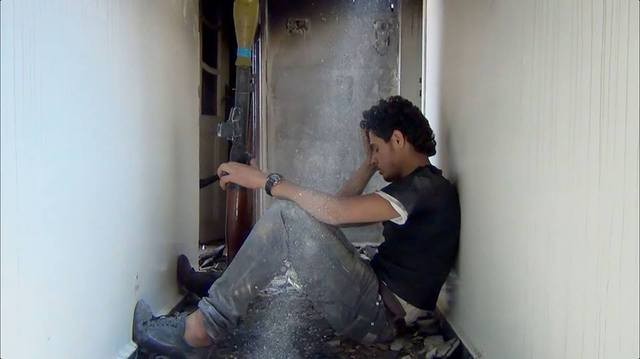 ABDEL-BASSET AL-SAROUT DURING A PERIOD OF EXHAUSTION IN RETURN TO HOMSRebel war in Syria up close
ABDEL-BASSET AL-SAROUT DURING A PERIOD OF EXHAUSTION IN RETURN TO HOMSRebel war in Syria up closeTalal Derki's
The Return to Homs is the most visceral and personal documentary about urban siege warfare one is likely to see, the narrative of the ravaged yet still defended city of Homs and one of its natives, a fiery young rebel leader. Neatly editing rough immediate footage in bombed-out buildings and rubble-filled streets, Derki, voicing-over in elegiac, composed classical Arabic, pulls together an otherwise very rugged and vernacular narrative of 2011 to 2013 from the point of view of young rebels engaged in a struggle to hold onto the city of Homs that was considered the capital of the anti-Assad revolution -- and hence was besieged by government forces till its apartment buildings and streets are nothing but concrete Swiss cheese with a scattering of cemeteries and mosques where the rebel martyrs are celebrated.
Derki follows two young Syrians. The main one is Abdel-Basset al-Sarout, a 19-year-old soccer goalie ranked second in the country. Handsome, charismatic and with a spark in his eyes, he could be an Arab Errol Flynn with a touch of James Franco. Basset, a blacksmith, emerges as a firebrand leader during early peaceful demonstrations. He becomes both a creator of rebel songs and, later, when convinced the revolution must fight back with arms, a street fighting leader. As a contrast to Basset, there is one of his close friends who sticks with him, Osama al-Homsi, a quiet 24-year-old university student-turned-media activist. Later Osama, who has been wounded but recovered, has been picked up at a checkpoint, his friends learn, and not heard from again.
Most of Basset's other closest friends get killed. Often they are trapped in one of two Homs neighborhoods, digging tunnels, firing from disintegrating buildings, and for a time forced out of the city altogether. Basset is wounded twice, in the leg and foot, and goes through several periods of exhaustion and near despair and starvation that shows on a face that after two years has visibly aged. But when Derki returns after several absences of a month or so, the wounded, limping Basset is back on his feet again. We see him often invent chants and songs and inspire men, smiling his charming smile. At one point we see him losing the will ("I can't do this anymore"). We see him after being wounded, half-raving and praying for the Bashar al-Assad regime to be defeated and for himself to die a martyr's death. Then he is back again, as if risen from the ashes and rubble.
Half of the merit of this film is the way it is able to stick to the continually failing, but never abandoned, efforts by rebels to defend the city of Homs. The other is its tenacious ability to give the narrative an appealing face by following Basset for this two-year period -- even when it's very dangerous where he is, so dangerous rebels are getting killed and wounded right in front of the camera. The action is so intense there's no time to be scared. Xian Brooks is right in his
Guardian Sundance review. It would have been nice, he says, to get more of a look at the few non-rebel survivors, women and old men, who are still in the city, as well as "a little more structure, context and analysis," but "The director's relentless, claustrophobic approach is surely an accurate reflection of the tragedy itself. There is no wider picture; the world has largely turned its back."
Return to Homs is what it is, and what it is is remarkable enough: a vivid snapshot, a poetic memoir, an impassioned plea -- a concentrated essence of all the hope, passion, and despair of the Arab Spring.
We follow Basset, we are at his side, and we feel his revolutionary charisma with his followers. But it's also clear -- Derki's voiceover says so, that this Homs rebel defense lacks coordination at some key moments. Brave and defiant though they are, their numbers and equipment are too limited to win. Yet while Basset expects to die more than once, as the narrative ends he is still alive and fighting.
Highly recommended, but only for the stout of heart: there are painful and disturbing images.
The Return to Homs/العودة إلى حمص [Al-3awdah ila Homs], 90 mins, exclusively in classical and colloquial Arabic with English subtitles, debuted at the Amsterdam documentary festival (IDFA) and won the world cinema jury documentary prize at Sundance January 2014. Screened for this review as part of the Film Society of Lincoln Center-Museum of Modern Art series New Directors/New Films, showing Tuesday, March 25, 2014 at 6:15pm at MoMA and Wednesday, March 26, 2014 at 9:00pm at Lincoln Center.





